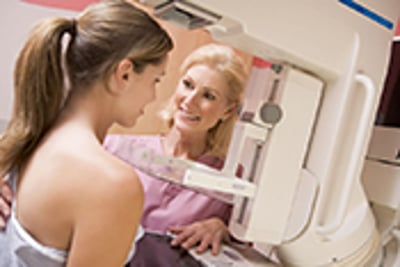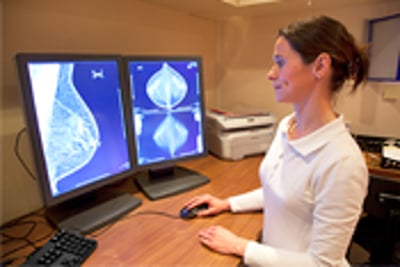In portal: Breast Cancer, Categories Screening



Relevance: Medium-High
Most relevant for: Women at average risk for breast cancer
Study: Routine breast cancer screening leads to overdiagnosis
Routine breast cancer screening for women of average risk has been controversial for many years because some believe that the benefits do not outweigh the risks. Recent headlines covering a study in Denmark suggests that routine breast cancer screening leads to “overdiagnosis” of breast cancer. (4/4/17)
READ MORE ›


Relevance: Medium-High
Most relevant for: People with breast cancer symptoms
Study: Women with breast cancer symptoms but no lump may wait longer to seek medical care
Some patients take longer than others before getting a potential breast cancer checked by their health care provider. Believing that women who have breast cancer symptoms but have no lump may wait longer, researchers in this study used data from women who were diagnosed with breast cancer in 2009 and 2010 to identify possible explanations. (1/18/17)
READ MORE ›


Relevance: Medium
Most relevant for: People considering genetic testing and people who are Ashkenazi Jewish
Personal Story: Why one woman passed on genetic testing
What are reasons to get or not get genetic testing? Cynthia Graber gives her thoughts on the matter in her Wired opinion piece, "Why I Won't Get the Genetic Test for Breast Cancer." (11/15/16)
READ MORE ›


Relevance: Medium
Most relevant for: Women who are at high risk for breast cancer due to family history, dense breasts, LCIS, or multiple biopsies
Study: Breast cancer screening should be tailored to a woman’s risk factors and breast density
The United States Preventative Services Task Force (USPSTF) recommends a screening mammogram every other year for women ages 50-74 who are at average risk for breast cancer. But do all patients in this category benefit from this screening regimen? 10/18/16
READ MORE ›


Relevance: Medium-Low
Most relevant for:
Personal Story: Dogs: Companions, hunters, and cancer detectors?
In August 2016, many news outlets published stories about how actress Shannen Doherty’s dog was able to sniff out her cancer before she was diagnosed. Is there scientific validity to that claim? (9/16)
READ MORE ›


Relevance: Medium-High
Most relevant for: Women with dense breast tissue on mammograms
Study: Dense breast notifications are informative but hard to read and understand
Some states offer women dense breast notifications that are meant to explain that dense breasts are risk factors for breast cancer and can hide cancer on mammograms, and to identify appropriate supplemental screening options. But recent research found that this information is often not easy to read or understand, which questions the usefulness of the documents. (6/7/16)
READ MORE ›


Relevance: Medium-High
Most relevant for: Young women at high risk for breast cancer with limited access to mammography and MRI is not easily accessible
Study: How do ultrasound and mammography compare in breast cancer screening?
Mammography has been shown to reduce breast cancer deaths; however, women in developing countries don’t have easy access to mammography. Ultrasound screening, on the other hand, is portable and less expensive, and could be an alternative to mammography. This study compared mammography to ultrasound in women with dense breasts and found the two techniques have similar cancer detection rates, although the false positive rate is higher with ultrasound. (02/16/16)
READ MORE ›